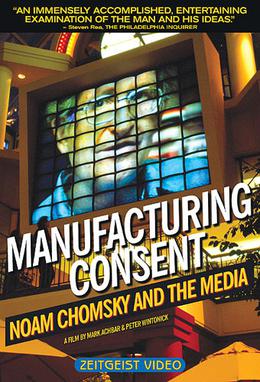
Manufacturing Consent: Noam Chomsky and the Media is a 1992 documentary film that explores the political life and ideas of linguist, intellectual, and political activist Noam Chomsky. Canadian filmmakers Mark Achbar and Peter Wintonick expand the analysis of political economy and mass media presented in Manufacturing Consent, a 1988 book Chomsky wrote with Edward S. Herman.
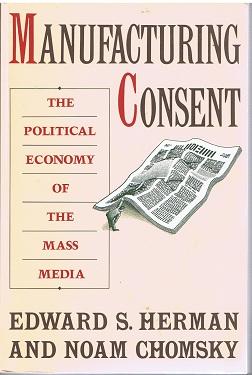
Manufacturing Consent: The Political Economy of the Mass Media is a 1988 book by Edward S. Herman and Noam Chomsky. It argues that the mass communication media of the U.S. "are effective and powerful ideological institutions that carry out a system-supportive propaganda function, by reliance on market forces, internalized assumptions, and self-censorship, and without overt coercion", by means of the propaganda model of communication. The title refers to consent of the governed, and derives from the phrase "the manufacture of consent" used by Walter Lippmann in Public Opinion (1922). The book was honored with the Orwell Award.

Avram Noam Chomsky is an American professor and public intellectual known for his work in linguistics, political activism, and social criticism. Sometimes called "the father of modern linguistics", Chomsky is also a major figure in analytic philosophy and one of the founders of the field of cognitive science. He is a laureate professor of linguistics at the University of Arizona and an institute professor emeritus at the Massachusetts Institute of Technology (MIT). Among the most cited living authors, Chomsky has written more than 150 books on topics such as linguistics, war, and politics. Ideologically, he aligns with anarcho-syndicalism and libertarian socialism.
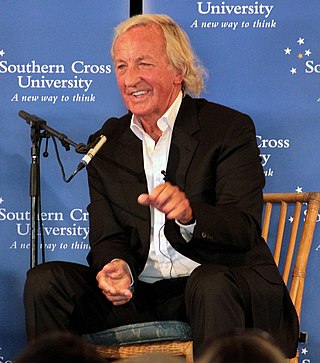
John Richard Pilger is an Australian journalist, writer, scholar, and documentary filmmaker. He has mainly been based in Britain since 1962. He has also been a visiting professor at Cornell University in New York.

Michael Albert is an American economist, speaker, writer, and political critic. Since the late 1970s, he has published books, articles, and other contributions on a wide array of subjects. He has also set up his own media outfits, magazines, and podcasts. He is known for helping to develop the socioeconomic theory of participatory economics.

Harper's Magazine is a monthly magazine of literature, politics, culture, finance, and the arts. Launched in New York City in June 1850, it is the oldest continuously published monthly magazine in the United States. Harper's Magazine has won 22 National Magazine Awards.

The propaganda model is a conceptual model in political economy advanced by Edward S. Herman and Noam Chomsky to explain how propaganda and systemic biases function in corporate mass media. The model seeks to explain how populations are manipulated and how consent for economic, social, and political policies, both foreign and domestic, is "manufactured" in the public mind due to this propaganda. The theory posits that the way in which corporate media is structured creates an inherent conflict of interest and therefore acts as propaganda for anti-democratic elements.

George Joshua Richard Monbiot is a British writer known for his environmental and political activism. He writes a regular column for The Guardian and is the author of a number of books.
David Edwards is a British media campaigner who is co-editor of the Media Lens website with David Cromwell. Edwards specialises in the analysis of mainstream, or corporate, mass media, which are normally considered impartial or liberal, an interpretation both men believe is disputable.

Media Lens is a British media analysis website established in 2001 by David Cromwell and David Edwards. Cromwell and Edwards are the site's editors and only regular contributors. Their aim is to scrutinise and question the mainstream media's coverage of significant events and issues and to draw attention to what they consider "the systemic failure of the corporate media to report the world honestly and accurately".
Edward Samuel Herman was an American economist, media scholar and social critic. Herman is known for his media criticism, in particular the propaganda model hypothesis he developed with Noam Chomsky, a frequent co-writer. He held an appointment as Professor Emeritus of finance at the Wharton School of Business of the University of Pennsylvania. He also taught at Annenberg School for Communication at the University of Pennsylvania.
South End Press was a non-profit book publisher run on a model of participatory economics. It was founded in 1977 by Michael Albert, Lydia Sargent, Juliet Schor, among others, in Boston's South End. It published books written by political activists, notably Arundhati Roy, Noam Chomsky, bell hooks, Winona LaDuke, Manning Marable, Ward Churchill, Cherríe Moraga, Andrea Smith, Howard Zinn, Jeremy Brecher and Scott Tucker. South End Press closed in 2014.
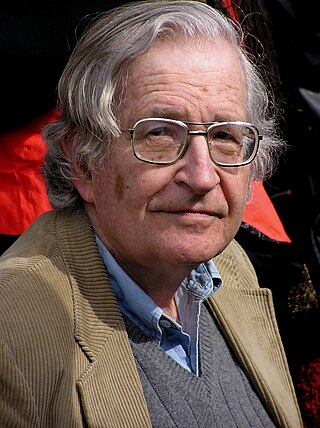
Noam Chomsky is an intellectual, political activist, and critic of the foreign policy of the United States and other governments. Noam Chomsky describes himself as an anarcho-syndicalist and libertarian socialist, and is considered to be a key intellectual figure within the left wing of politics of the United States.

The Anti-Chomsky Reader is a 2004 anthology book about the linguist and social critic Noam Chomsky edited by Peter Collier and David Horowitz. Its contributors criticize Chomsky's political and linguistic writings, claiming that he cherry-picks facts to fit his theories.
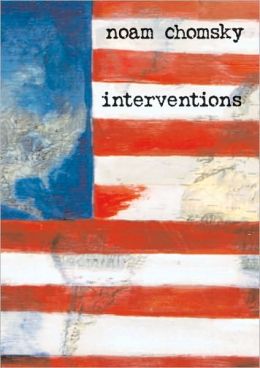
Interventions is a book by Noam Chomsky, an American academic linguist and political activist. Published in May 2007, Interventions is a collection of 44 op-ed articles, post-9/11, from September 2002, through March 2007. The book's subjects span from 9/11 and the Iraq War to social security and intelligent design, South America and Asia, the Israeli occupation of Palestine and the election of Hamas, Hurricane Katrina, and the US concept of "just war". The Pentagon banned the book from its Guantanamo Bay prison because it might negatively "impact ... good order and discipline." Chomsky replied that, "This happens sometimes in totalitarian regimes."
Counter-Revolutionary Violence: Bloodbaths in Fact & Propaganda is a 1973 book by Noam Chomsky and Edward S. Herman, with a preface by Richard A. Falk. It offers a critique of United States foreign policy in Indochina.
Guardians of Power: The Myth of the Liberal Media (ISBN 9780745324838) is a book by David Edwards and David Cromwell, editors of the British media analysis Media Lens website, published in 2006 by Pluto Press of London.
This is a list of writings published by the American author Noam Chomsky.
Alexander Edward Carey was an Australian writer, author, social psychologist, academic and sociologist. Praised for his work regarding corporate propaganda, Carey has influenced Noam Chomsky, Edward S. Herman and was called a "second Orwell in his prophesies" by Australian journalist and author John Pilger.

Occupy is a short study of the Occupy movement written by the American academic and political activist Noam Chomsky. Initially published in the United States by the Zuccotti Park Press as the first title in their Occupied Media Pamphlet Series in 2012, it was subsequently republished in the United Kingdom by Penguin Books later that year.













